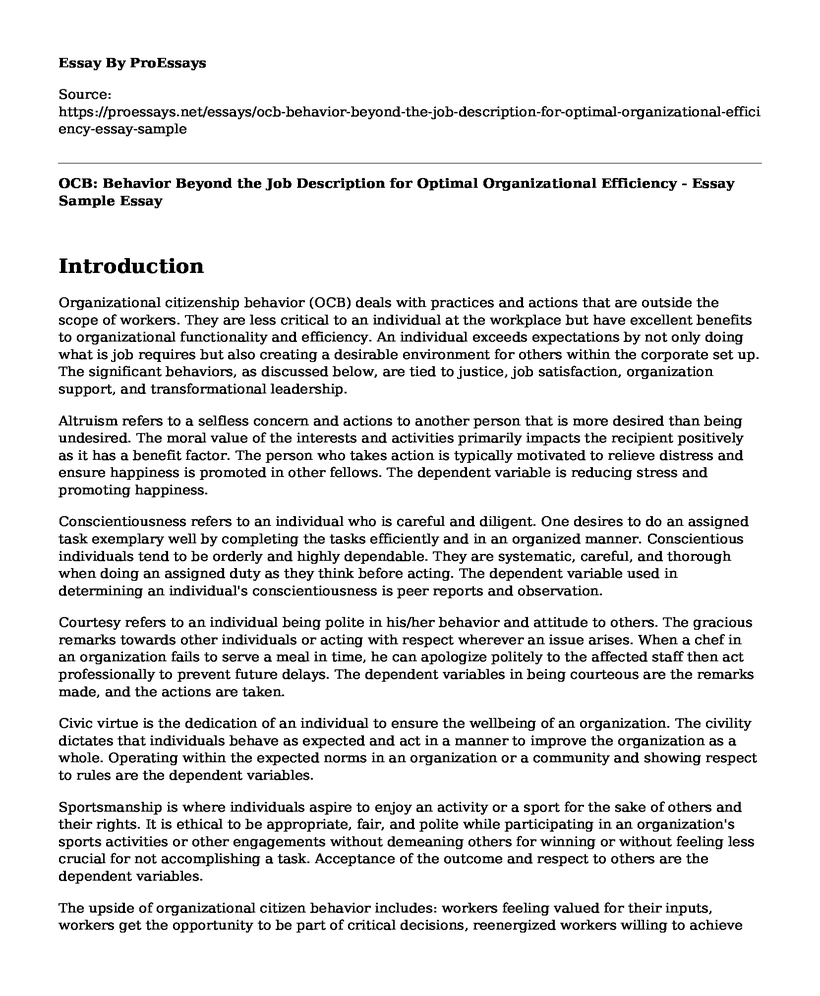Introduction
Organizational citizenship behavior (OCB) deals with practices and actions that are outside the scope of workers. They are less critical to an individual at the workplace but have excellent benefits to organizational functionality and efficiency. An individual exceeds expectations by not only doing what is job requires but also creating a desirable environment for others within the corporate set up. The significant behaviors, as discussed below, are tied to justice, job satisfaction, organization support, and transformational leadership.
Altruism refers to a selfless concern and actions to another person that is more desired than being undesired. The moral value of the interests and activities primarily impacts the recipient positively as it has a benefit factor. The person who takes action is typically motivated to relieve distress and ensure happiness is promoted in other fellows. The dependent variable is reducing stress and promoting happiness.
Conscientiousness refers to an individual who is careful and diligent. One desires to do an assigned task exemplary well by completing the tasks efficiently and in an organized manner. Conscientious individuals tend to be orderly and highly dependable. They are systematic, careful, and thorough when doing an assigned duty as they think before acting. The dependent variable used in determining an individual's conscientiousness is peer reports and observation.
Courtesy refers to an individual being polite in his/her behavior and attitude to others. The gracious remarks towards other individuals or acting with respect wherever an issue arises. When a chef in an organization fails to serve a meal in time, he can apologize politely to the affected staff then act professionally to prevent future delays. The dependent variables in being courteous are the remarks made, and the actions are taken.
Civic virtue is the dedication of an individual to ensure the wellbeing of an organization. The civility dictates that individuals behave as expected and act in a manner to improve the organization as a whole. Operating within the expected norms in an organization or a community and showing respect to rules are the dependent variables.
Sportsmanship is where individuals aspire to enjoy an activity or a sport for the sake of others and their rights. It is ethical to be appropriate, fair, and polite while participating in an organization's sports activities or other engagements without demeaning others for winning or without feeling less crucial for not accomplishing a task. Acceptance of the outcome and respect to others are the dependent variables.
The upside of organizational citizen behavior includes: workers feeling valued for their inputs, workers get the opportunity to be part of critical decisions, reenergized workers willing to achieve more, increased workers' productivity and career development for new organizational members. The vital issue with OCB is when an organization uses it to appraise workers or carry out job reviews. Workers may carry themselves out in a manner to manipulate the appraisals by pretense.
Transformational Leader Behaviors refers to influential, intellectual, inspirational, and individual actions by leaders that motivate and stimulate other workers in organizations. The leading by example helps workers to be courageous, confident, and risk-takers while carrying out assigned duties. The independent variables include a leader's behavior, which encompasses values of honesty, fairness, justice, loyalty, human rights, and equality. The response is achieved through being futuristic with the organization, nurturing individuals, personal development, building trust, and fostering interdependent relationships.
From this study, the mediating variables in OCB that tries to explain the relationship between independent and dependent relationship are trust and satisfaction. Trust refers to the honesty and integrity of a worker. When you believe that a worker is truthful, that means you trust the worker. For personal development and nurturing of workers, the organizational leaders need to give opportunities to all workers who will be exposed to similar assignments and keenly observed on how they respond to them. Workers who respond favorably to expectations or exceeding exceeds expectations are groomed to fill up future leadership roles.
Satisfaction as a mediating variable links the future of the organization with workers who are aspiring leaders. The workers are identified at early stages then nurtured through exposure to training programs and other teamwork activities. The exposure's primary aim is to enhance continuous improvement in workers. The workers who have high satisfaction levels are given a hand on managerial to sharpen their already proven OCB.
The role of mediating variables is ensuring organizational well-being by assuring continuity. Most, if not all, organizations need workers who can improve the work environment from good to better by being influential to others. Being an intellect with a positive influence on others is the desired behavior in an organization's future.
Cite this page
OCB: Behavior Beyond the Job Description for Optimal Organizational Efficiency - Essay Sample. (2023, May 12). Retrieved from https://proessays.net/essays/ocb-behavior-beyond-the-job-description-for-optimal-organizational-efficiency-essay-sample
If you are the original author of this essay and no longer wish to have it published on the ProEssays website, please click below to request its removal:
- A Promotional Campaign for Poland in Chile
- HCT Group UK (Social Enterprise) Paper Example
- Essay Sample on Organizational Design
- Organizational Analysis Report: St. Jude's Children Research Hospital
- Adapt or Fail: Change is Inevitable for Organizations - Essay Sample
- Essay Sample on AirBnb Launches New Logo: A Public Relations Campaign
- OCB: Behavior Beyond the Job Description for Optimal Organizational Efficiency - Essay Sample







